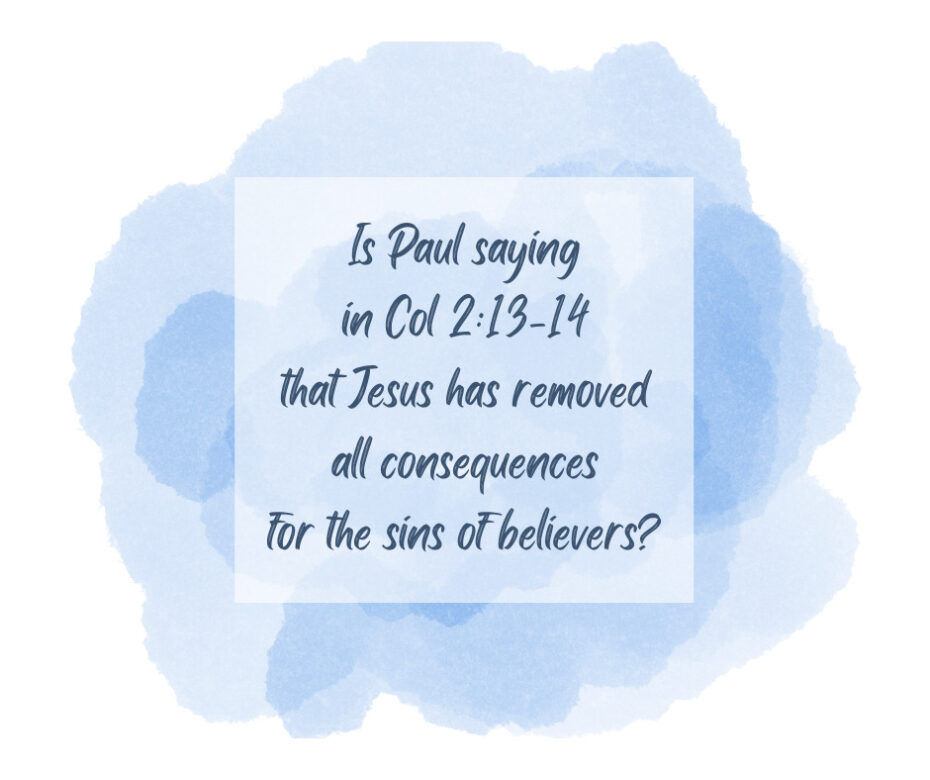R. M. asks a great follow-up question to a blog I wrote entitled “What Did Jesus Purchase by His Death on the Cross?” (see here). I suggested that His death on the cross accomplished many things, but that what He purchased was the kingdom, the pearl of great price, the hidden treasure. As part of that purchase, He bought all of humanity (see 2 Pet 2:1; 1 John 2:2) so that anyone who believes in Him has everlasting life and is guaranteed to be part of his eternal kingdom. Here is R.M.’s question:
Amen, but what about Col 2:13-14?
It seems to say Christ took away our punishment and penalty (but not using those exact words, e.g., “penalty,” but the meaning is there it seems): “And you, being dead in your trespasses and the uncircumcision of your flesh, He has made alive together with Him, having forgiven you all trespasses, having wiped out the handwriting of requirements that was against us, which was contrary to us. And He has taken it out of the way, having nailed it to the cross.”
It seems to me Paul is saying that the law was against us, condemned us to some punishment, but Christ took violations of the law we did and its implied penalties (if you violate the law, you will die or get punished says the Law of Moses) and He nailed the law violations to the cross, which means He died for us and took our penalty.
What do you think?
To me, just because the Bible does not use some exact words does not mean it does not teach something. Using logic and reasoning (which you do often and well most of the time) shows that of course Jesus paid the penalty in our place. The Bible does say that by just using lots of other words and ideas, even though it does not use the exact wording paid the penalty for us. The meaning is there.
It is true that a word need not be present in a verse for that concept to be present. For example, in Eph 2:8, Paul famously did not mention Jesus. He said, “By grace you have been saved through faith…” But he means faith in Christ. The readers knew that.
Colossians 2:13-14 does not suggest that Jesus’ death on the cross removes the penalties for sins. That is a misunderstanding of what he wrote.
Paul is writing to believers. He says, as he did in Eph 2:5, that God gave them everlasting life. They were spiritually dead. He made them alive.
Along with the gift of everlasting life, believers receive the forgiveness of sins. That is, believers start the Christian life with a clean slate. We do need ongoing forgiveness, often called fellowship forgiveness, as 1 John 1:9 shows. But we don’t need to confess the sins we committed before the new birth. We start the Christian life in fellowship with God due to His amazing forgiveness.
F. F. Bruce commented,
The sins which have now been forgiven represented, so to speak, a mountain of bankruptcy which those who had incurred it were bound to acknowledge but could never have any hope of discharging. They had violated the ordinances of the law, and nothing that they might do could afford redress. But Christ wiped the slate clean and gave them a fresh start (The Epistles to the Colossians, Philemon, and Ephesians, p. 109).
Bruce also suggests that in v 15 Paul was alluding to the fact that the new birth sets us free from bondage to sin in our position.
Colossians 2:13-14 does not say that God eliminated the consequences of ongoing sins for anyone.i
Even the believer in fellowship with God reaps what he sows. If he drives after having had a few drinks and gets stopped by the police, he may learn that his blood alcohol is over .08, and he would have a DWI on his record. He likely would immediately confess that sin (see Eph 5:18) to the Lord. But there would still be lots of negative consequences. And those are not just from the government, because God has told us that the government “is God’s minister, an avenger to execute wrath on him who practices evil” (Rom 13:4).
The reason all will die until the time of the Rapture is because all sin. Someday, death will be no more. But not now. Now, the wages of sin are still death.
When Paul says that God has wiped out “the handwriting of requirements that was against us,” he had in mind the Law of Moses. Believers are no longer under the Law of Moses, as he said a few verses later: “So let no one judge you in food or in drink, or regarding a festival or a new moon or sabbaths…” (Col 2:16). Geisler wrote, “Legalism is wrong because believers are dead to the Law in Christ. He fulfilled its demands in His life and by His death, and Christians are in Him” (“Colossians” in The Bible Knowledge Commentary, p. 678).ii
__________
i Colossians 2:13-14 doesn’t even say the Lord Jesus eliminated the consequences for sins of believers committed before their new birth. A criminal who comes to faith starts the Christian life in fellowship with God and in prison. He stays in prison until he pays for the offense he committed. An unbelieving man divorced due to adultery who comes to faith is forgiven by God and in fellowship with Him, but the consequences of his adultery are not eliminated.
ii Believers are still under the commands of the NT, called “the law of liberty” (Jas 1:25; 2:12), “the royal law” (Jas 2:8), “the law of Christ” (Gal 6:2), and “the law of the Spirit of life in Christ Jesus” (Rom 8:2).


